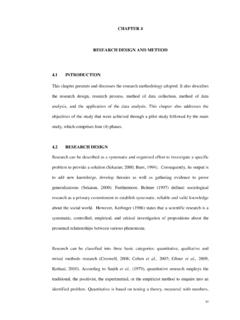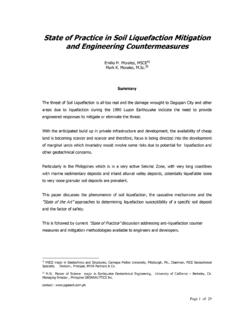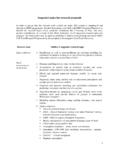Transcription of How to choose a research methodology? - …
1 1 How to choose a research methodology ? MSc Business Information SystemsProject 1: Applying research MethodologiesProf. Dr. Knut HinkelmannDr. Hans Friedrich WitschelLearning goals understand ways of looking at research (meta science) get to know methodologies to guide your research understand the principles of design-based research2 MSc Business Information SystemsProject 1: Applying research MethodologiesProf. Dr. Knut HinkelmannDr. Hans Friedrich WitschelMETA SCIENCE3 MSc Business Information SystemsProject 1: Applying research MethodologiesProf. Dr. Knut HinkelmannDr. Hans Friedrich WitschelResearch Onion4(Saunders et al. 2009)MSc Business Information SystemsProject 1: Applying research MethodologiesProf. Dr. Knut HinkelmannDr. Hans Friedrich WitschelMeta science The science about science: systematic categorisation ofresearch according to dimensions such as: Philosophy: positivist vs. interpretivist, analytical vs. design Approach: deductive vs. inductive Choice of Data: quantitative vs.
2 Qualitative Strategy: Survey vs. experiment vs. case study vs..5 MSc Business Information SystemsProject 1: Applying research MethodologiesProf. Dr. Knut HinkelmannDr. Hans Friedrich WitschelPhilosophy: Positivist vs. interpretivist1. Positivist: believes in the possibility to observe and describereality from an objective viewpoint observethe world in some neutral and objective way, discover general relationships and universal laws, derivetheories, testthem observations should be repeatable2. Interpretivist:believes that it is necessary to understanddifferences between humans in our roles as social actors understand the world from the point of view of the social actors, different interpretations are possible and thus are subjective qualitative, non-quantitative questions6 MSc Business Information SystemsProject 1: Applying research MethodologiesProf. Dr. Knut HinkelmannDr. Hans Friedrich WitschelPhilosophy: Analytical vs design (1) Analytical science (empirical) understanding reality, concerned with general statements about reality fields: natural sciences, economics, sociology.
3 New research results can falsify existing theories Design science (constructive) concerned with the design of artificial constructs (concepts, designs) fields: mathematics, engineering (including computer science), humanities (languages, literature, law, arts) existing constructs remain valid but new constructs may be considered as superior. Examples: a new algorithm shows a better performance than a previous one a new software shows a substantial increase in usability7adapted from Thomas HanneMSc Business Information SystemsProject 1: Applying research MethodologiesProf. Dr. Knut HinkelmannDr. Hans Friedrich WitschelPhilosophy: Analytical vs design (2) Analytical and design research in information systemsdesign scienceanalytical sciencedesign and study of: formal languages mathematical models algorithms prototypesinterviewscase studiesadapted from Thomas HanneMSc Business Information SystemsProject 1: Applying research MethodologiesProf. Dr. Knut HinkelmannDr. Hans Friedrich WitschelTrends: research in Business Information SystemsAmerica: Information Systems research Focus is Explanation Result: Observation Properties of Information Systems Behaviour of users Social Sciences: Behaviourism , Positivism Strength: Scientific Problem: Relevance for practiceEurope: Business Informatics Focus is Design , Result: Artefacts Constructs, methods, Models, instantiations, prototypes Engineering: Design Science research , Constructivism Strength: Relevance for practice Problem: research methodolgy9nach ( sterle et al.)
4 2010)MSc Business Information SystemsProject 1: Applying research MethodologiesProf. Dr. Knut HinkelmannDr. Hans Friedrich WitschelGoal of research The goals ofdesign-orientedresearch are guidelines for the construction and operation of informationsystems innovations of information systems (instances) The goals ofbehavioristicresearch are analyses information systems as a phenomenon (actualsituations) cause-effect relationships in the use of information systems10nach ( sterle et al. 2010)MSc Business Information SystemsProject 1: Applying research MethodologiesProf. Dr. Knut HinkelmannDr. Hans Friedrich WitschelDesign Science vs. Behavioral Science11(Hevner & Chatterjee 2010)MSc Business Information SystemsProject 1: Applying research MethodologiesProf. Dr. Knut HinkelmannDr. Hans Friedrich WitschelProblems of Design Orientation Success criterion: relevant, useful results Validation often by implementation in practice economic payoff Consequence: Many publications of results are without rigouros, scientific evidence no research12 Goal: Simultanuous achievement of Design orientation Scientific rigorbased on ( sterle et al.
5 2010)MSc Business Information SystemsProject 1: Applying research MethodologiesProf. Dr. Knut HinkelmannDr. Hans Friedrich WitschelApproach: Deductive vs. Inductive (1) Deductive approach: from general to specific Develop a theory(out of previous findings(literature), experience, some first observations,..) Derive a hypothesisfrom the theory Makeobservations obtain a confirmationor rejection of the hypothesis Inductive approach: from specific to general Makeobservations Find patterns Create a hypothesis, explore/validate it Form a theoryout of hypotheses13 TheoryHypothesisObservationsConfirmation ObservationsPatternsHypothesisTheoryMSc Business Information SystemsProject 1: Applying research MethodologiesProf. Dr. Knut HinkelmannDr. Hans Friedrich WitschelApproach: Deductive vs. Inductive (2)14 Question:If you ve read literature (=theory?), does that meanautomatically that your approach must be deductive??MSc Business Information SystemsProject 1: Applying research MethodologiesProf.
6 Dr. Knut HinkelmannDr. Hans Friedrich WitschelChoices: Quantitative vs. qualitative Quantitative research : focuses on verifying hypotheses (deductive) or finding patterns(inductive) using typicallylarge amounts of data Qualitative research : focuses on understanding the important characteristics of typicallysmall samples of data Example:investigate users response to an interface quantitative approach: collect ratings, verify user acceptance qualitative approach: understandwhyusers interact with the interfacein certain ways15 MSc Business Information SystemsProject 1: Applying research MethodologiesProf. Dr. Knut HinkelmannDr. Hans Friedrich WitschelResearch ChoicesResearch choicesMono methodMultiple methodsMulti methodMulti-methodquantitative studiesMulti-methodqualitative studiesMixed methodMixed-methodresearchMixed-model research16(Saunders et al. 2009)MSc Business Information SystemsProject 1: Applying research MethodologiesProf. Dr. Knut HinkelmannDr. Hans Friedrich WitschelResearch Strategies, Choices and Philosophy17(De Villiers 2005)MSc Business Information SystemsProject 1: Applying research MethodologiesProf.
7 Dr. Knut HinkelmannDr. Hans Friedrich WitschelSTRATEGIES18 MSc Business Information SystemsProject 1: Applying research MethodologiesProf. Dr. Knut HinkelmannDr. Hans Friedrich WitschelWhat is a research strategy? A research strategy usually has A goal: something it can be used for A procedure: steps to follow to achieve results A set of techniques involved in the procedures .. and it is often based on a certain type of science (seeprevious slide block)19 MSc Business Information SystemsProject 1: Applying research MethodologiesProf. Dr. Knut HinkelmannDr. Hans Friedrich WitschelResearch methodologies overview20 StrategyGoalSurvey studiesfind patterns in dataExperimentstest hypothesesCase studiesstudy the characteristics of a real-life instanceAction researchiteratively solve a problem with a community of practiceDesign researchgenerate an artefactMSc Business Information SystemsProject 1: Applying research MethodologiesProf. Dr. Knut HinkelmannDr. Hans Friedrich WitschelSurvey studies Goal: find patterns in data Procedure:1.
8 Collect data from a large group of objects in a standardized and systematic way2. evaluate the data, by using statistical methods3. identify patterns, especially those which were not expected4. interpret results Techniques:observation, measurement, construction, questionnaires, interviews, literature research Type of research : inductive, empirical21adapted from Thomas HanneMSc Business Information SystemsProject 1: Applying research MethodologiesProf. Dr. Knut HinkelmannDr. Hans Friedrich WitschelSurvey studies data collection (1) Sources: nature, technical or information systems, people, companies, literature, .. Means of collecting: Observation: using one s senses Measurement: using technical instruments ( a thermometer) Construction: data is obtained using an artefact ( , the output of some algorithm) Data transactions Questionnaires Interviews Literature research22adapted from Thomas HanneMSc Business Information SystemsProject 1: Applying research MethodologiesProf.
9 Dr. Knut HinkelmannDr. Hans Friedrich WitschelSurvey studies data collection (2)primary and secondary data double meaning1. primary data: data collected within one s own researchsecondary data: usage of data in research collected bysomeone else2. primary data = input data of a research methodsecondary data = derived data (resulting from a researchmethod)23adapted from Thomas HanneMSc Business Information SystemsProject 1: Applying research MethodologiesProf. Dr. Knut HinkelmannDr. Hans Friedrich WitschelSurvey studies interpretation of data Quantitative analyses: counting the frequency of specific events observing the timing of specific events (requires some measurement) counting the number of objects ( persons in a queue) Qualitative analyses: observing the specific behavior of a person ( a computer user for evaluating the usability of a software) interviewing stakeholders ( users of an information systems) observing the nonverbal communication of people in a meeting some observations are hardly possible to separate from interpretation24adapted from Thomas HanneMSc Business Information SystemsProject 1: Applying research MethodologiesProf.
10 Dr. Knut HinkelmannDr. Hans Friedrich WitschelExperiments Goal: test hypotheses Procedure:1. formulate a hypothesis2. collect evidence3. test hypothesis based on evidence Techniques:benchmarking, statistical significance tests Type of research : positivist, deductive, quantitative26 MSc Business Information SystemsProject 1: Applying research MethodologiesProf. Dr. Knut HinkelmannDr. Hans Friedrich WitschelExperiments verification problem problem: falsification of a hypothesis can be done with one experiment, verification usually not! it is usually not possible to draw conclusions from one instance being tested because the observed results may be different using other test data : how many test instances are needed for testing your new algorithm?27adapted from Thomas HanneMSc Business Information SystemsProject 1: Applying research MethodologiesProf. Dr. Knut HinkelmannDr. Hans Friedrich WitschelExperiments requirements1. Ensure validity of claims by careful design.






